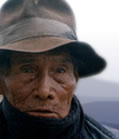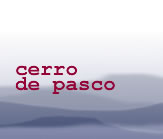 |
 |
||
 |
|||
|
RELATED THEMES community activities culture and customs history social change OTHER LOCAL THEMES BACKGROUND |
identity
For many narrators, the clearest definition of their identity seems to be their role as a comunero: being a member of a community with all the rights and responsibilities that this entails. Women can be comuneros in their own right, but only if they are widowed, inherit land or are the recognised head of their household; "But if a woman is married, she and her husband cannot be comuneros because otherwise they'd be taking up more space, more land, more animals and more benefits.it's the man who is the comunero" (Peru 1). Despite the changes to the land caused by industry, and its impact on farming and herding, it's clear that being a comunero still exerts a powerful influence over people's priorities and expectations. One man describes how the widespread need to take work in the mines in order to supplement farming income invariably involves a conflict of interests - a conflict which mining, which shuts people off from the outside world, tends to obscure at first: "Unfortunately, before, when I worked at Centromin and at the Cerro de Pasco Corporation, I felt more like a miner than a comunero, but then you think it over and you say, but this is my community and its my land and you finally realise that you're a comunero, because this is your land and you're going to die here" (Peru 14). But another man says that the change of occupation sometimes alters people irrevocably. Describing people from his village who went away to work in mines, he says "they forget about their community, they become more like foreigners or people from the coast. It's very strange. People come back different" (Peru 8). Yet, he notes with some irony, that when people are living away from home, their sense of identity can sometimes be sharpened: "For example, in Lima there are nearly 70 people from this community. They get together; they've got their committee. it's like they live in my community while they're there." Some who are knowledgeable about the region's history and culture emphasise how important it is to pass this on down generations, so that people can retain a sense of identity, especially since the mining industry attracted an influx of workers with different cultural traditions. One feels that acknowledging and building on a sense of identity is vital for the region's development: "I believe we'll develop when we recognise our Andean culture; its not just to do with economic development but also with personal development, cultural development" (Peru 15). Janios, a teacher with enthusiasm for cultural history, says "a longing for the Incan Empire" is demonstrated through many of the feasts still celebrated: "It's a longing which is still there, latent, in many Andean villages." (Peru 26) He feels that it is when people are older that their identity becomes important to them; younger people are more attracted by modern culture. Some narrators speak with pride of their highland traditions, self-sufficiency and local foods but sense that their children will longer identify themselves with the land and its traditions as they do: "These days a campesino will say for example, 'I'm a campesino but my son isn't.' That's to say [he] doesn't want his son to be a campesino like himself" (Peru 15). Relatively few specifically mention Quecha as being part of their identity. Most people say, with regret, that the language is dying out but feel the dominance of Spanish is inevitable, given so many young people need to find work elsewhere. quotes about identity"[To be a comunero] means to belong to a community. To have land. To work the land. To help with the communal work, to do the work of everybody. To contribute to the maintenance of the community livestock and crops. To respect the authorities. This is what being a good comunero is all about. normally it's the children of other comuneros who ask to be [one], or they inherit land from the community authorities. There are few people [from outside] who become [comuneros] though sometimes they do, sometimes through marriage. It was even rarer before; people only married between members of the community and the husband had to have land and cattle to be able to ask for a girl's hand." "To be comunero.you have to be registered in the community book where all the comuneros are listed. each year it needs to be updated, including all the information. We have to pay our annual subscription and then we take up one of the jobs within the community and this has to include livestock. Being a comunero means for instance you have the right to acquire land, a piece of communal land where you can raise your sheep or cattle or llamas in total freedom. This is your right and your duty above all else is to look after the heritage of the community and take part in the communal activity." "Me, yes, at my age, I'm still a comunero, but I'm exonerated from payments, from extra fees, the community quotas. But I still work as a comunero, in the cooperative and in the campesina community." "I was a [community] member in Pomacocha and when I came to Yauli I also became one, but my animals died and I don't know what to do. I don't have the strength now to start all over again. I hope the other comuneros come to my aid. Being a comunero means you have to give and receive, take part in communal work. You have to look after the community land and the livestock and you have your own land and your own animals. Now I no longer have any animals, just land, but without livestock it's useless." "When I was in Cuzco in 1994 I was a little surprised not to hear Cuzcan music. I thought Cuzco was the symbol of Peruvian identity and imagined that I would hear a lot of huayno there, but that wasn't the case. Young people here have the same problem, 15 to 25-year-olds like to listen to pop, rock, salsa or just chicha music. But from 25 on they tend to go back to their roots, to rediscover their identity. Lots of 22-year-olds now talk about their identity, about cultural recovery and valuing Pascan culture." "It's very rare for young people to speak Quechua. Before in my community, until I went to Lima, I didn't know how to speak Spanish. It was really hard for me to learn Spanish, but now the young people who come here forget Quechua and go here and there speaking Spanish to everybody." |
|